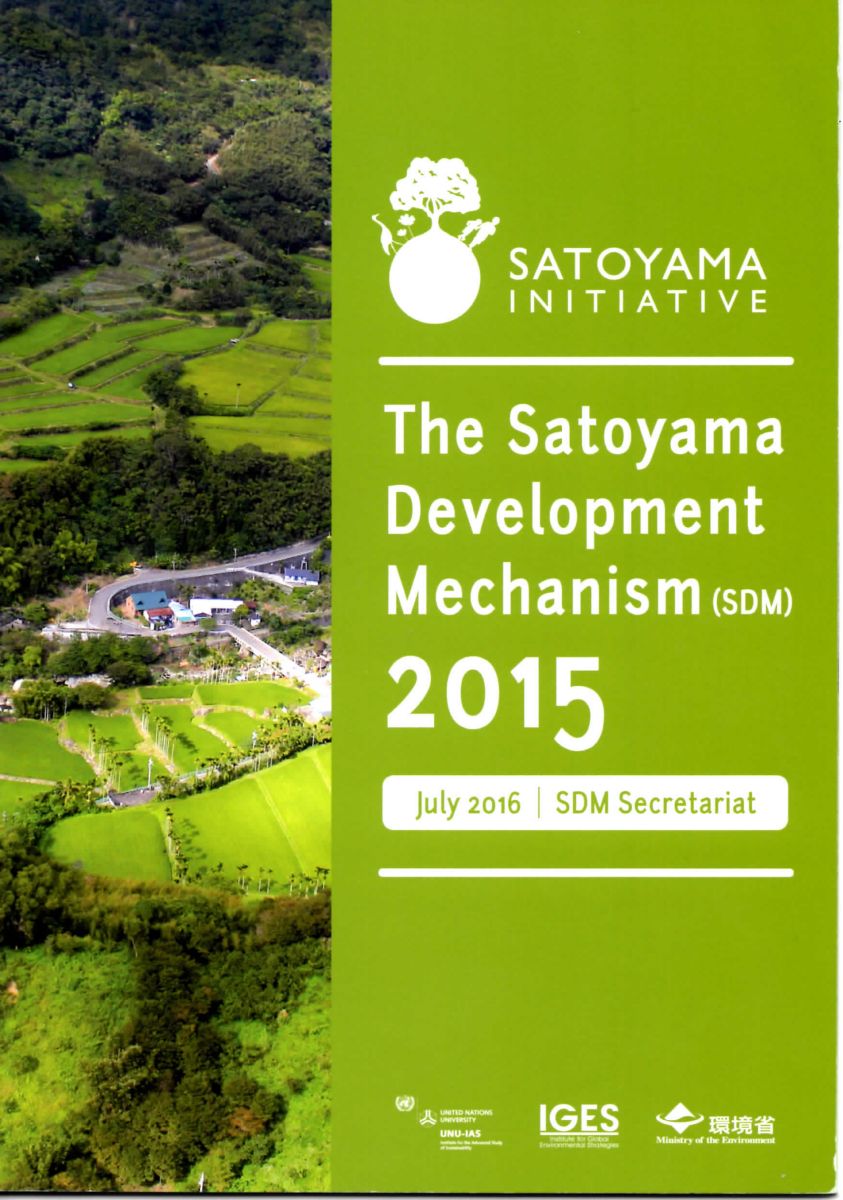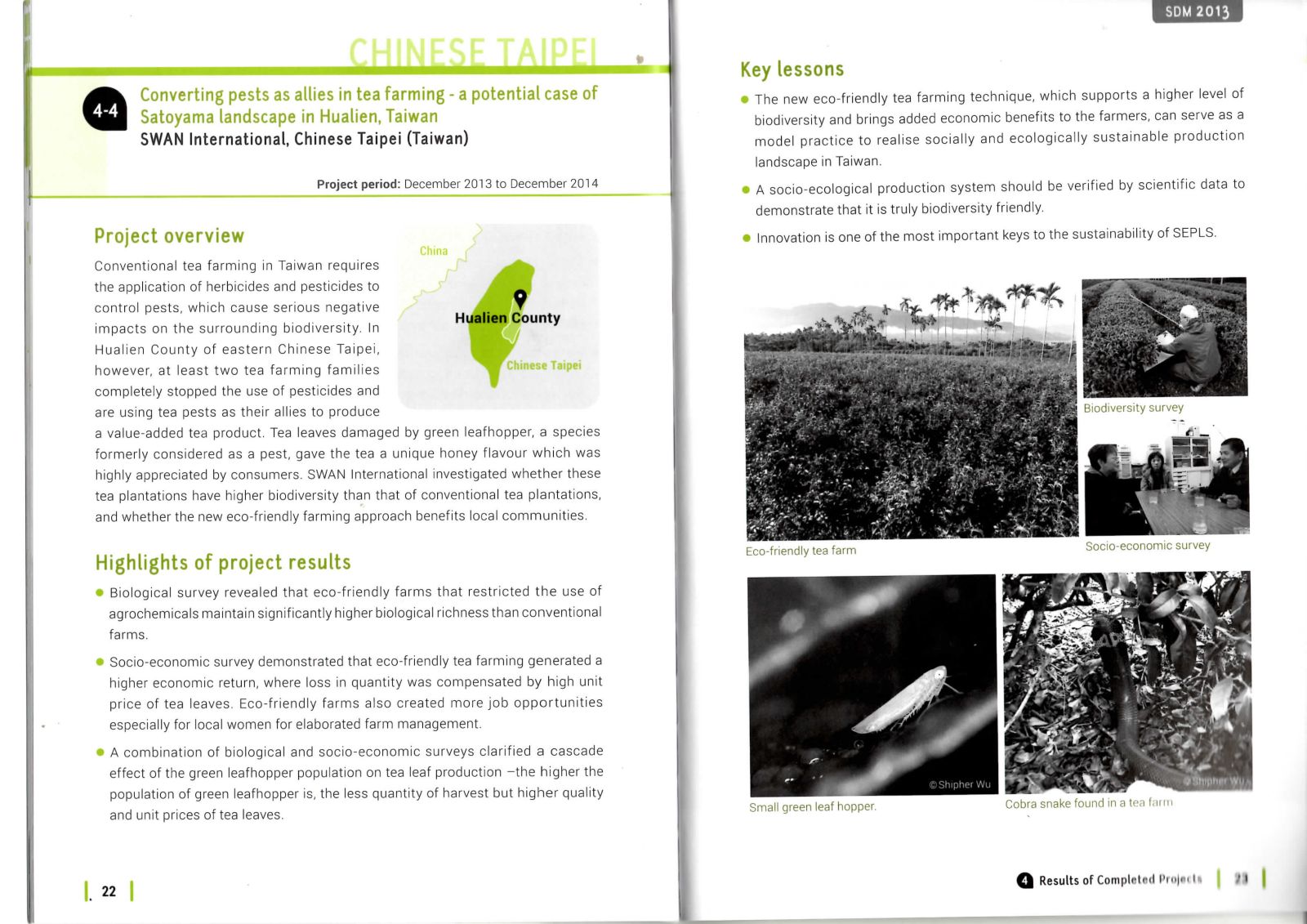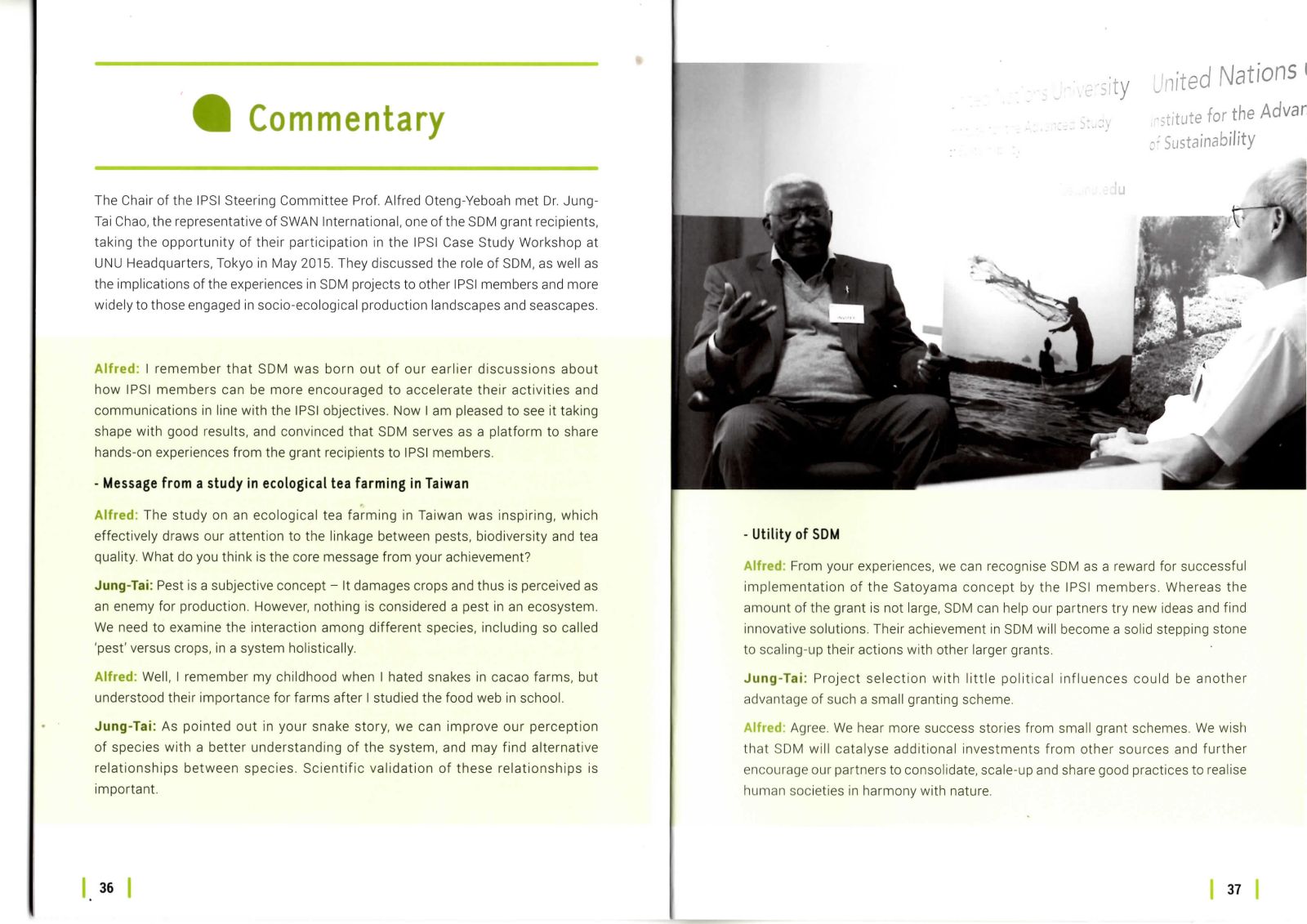SWAN團隊在2010年,從聯合國第10屆生物多樣性公約締約大會上帶回里山倡議的概念,隨即在林務局召開2天的會議分享他山之石。
2012年SWAN成為台灣首個加入IPSI會員的非營利組織。
2013年,在趙榮台博士和李玲玲教授的主持下,SWAN取得國內首項 IPSI經費贊助的研究案Converting pests as allies in tea farming - a potential case of Satoyama landscape in Hualien, Taiwan,以下是團隊向國際分享台灣推動里山倡議的記錄。
Satoyama initiative
The Satoyama Development Mechanism (SDM) 2015
Converting pests as allies in tea farming - a potential case of Satoyama landscape in Hualien, Taiwan

SWAN International, Chinese Taipei (Taiwan)
Project period: December 2013 to December 2014
Project overview
Conventional tea farm in Taiwan requires the application of herbicides and pesticides to control pests, which cause serious negative impacts on the surrounding biodiversity . In Hualien County of eastern Chinese Taipei, however, at least two tea farming families completely stopped the use of pesticides and are using tea pests as their allies to produce a value-added tea product. Tea leaves damaged by green leafhopper, a species formerly considered as a pest, gave the tea a unique honey flavour which was highly appreciated by consumers. SWAN International investigated whether these tea plantations have higher biodiversity than that of conventional tea plantations, and whether the new eco-friendly farming approach benefits local communities.
Highlights of project results
.Biological survey revealed that eco - friendly farms that restricted the use of agrochemicals maintain significantly higher biological richness than conventional farms.
.Socio-economic survey demonstrated that eco-friendly tea farming generated a higher economic return, where loss in quantity was compensated by high unit price of tea leaves. Eco-friendly farms also created more job opportunities especially for local women for elaborated farm management.
.A combination of biological and socio - economic surveys clarified a cascade effect of the green leafhopper population on tea leaf production - the higher the population of green leafhopper is, the less quantity of harvest but higher quality and unit prices of tea leaves.
Key lessons
.The new eco-friendly tea farming technique, which supports a higher level of biodiversity and brings added economic benefits to the farmers, can serve as a model practice to realise socially and ecologically sustainable production landscape in Taiwan.
.A socio-ecological production system should be verified by scientific data to demonstrate that it is truly biodiversity friendly.
.Innovation is one of the most important keys to the sustainability of SEPLS.

Commentary
The Chair of the IPSI Steering Committee Prof. Alfred Oteng-Yeboah met Dr. Jung-Tai Chao, the representative of SWAN international, one of the SDM grant recipients, taking the opportunity of their participation in the IPSI Case Study Workshop at UNU Headquarters, Tokyo in May 2015. They discussed the role of SDM, as well as the implications of the experiences in SDM projects to other IPSI members and more widely to those engaged in socio-ecological production landscapes and seascapes.
Alfred : I remember that SDM was born out of our earlier discussions about how IPSI members can be more encouraged to accelerate their activities and communications in line with the IPSI objectives. Now I am pleased to see it taking shape with good results, and convinced that SDM serves as a platform to share hands-on experiences f r om the grant recipients to IPSI members.
- Message from a study in ecological tea farming in Taiwan
Alfred : The study on an ecological tea farming in Taiwan was inspiring, which effectively draws our attention to the linkage between pests, biodiversity and tea quality. What do you think is the core message from your achievement?
Jung-Tai:Pest is a subjective concept - It damages crops and thus is perceived as an enemy for production. However, nothing is considered a pest in an ecosystem.
We need to examine the interaction among different species, including so called 'pest' versus crops, in a system holistically.
Alfred : Well, I remember my childhood when I hated snakes in cacao farms, but understood their importance for farms after I studied the food web in school.
Jung-Tai: As pointed out in your snake story, we can improve our perception of species with a better understanding of the system, and may find alternative relationships between species. Scientific validation of these relationships is important.
- Utility of SDM
Alfred : From your experiences, we can recognise SDM as a reward for successful implementation of the Satoyama concept by the IPSI members. Whereas the amount of the grant is not large, SDM can help our partners t ry new ideas and find innovative solutions. Their achievement in SDM will become a solid stepping stone to scaling-up their actions with other larger grants.
Jung-Tai:Project selection with little political influences could be another advantage of such a small granting scheme.
Alfred : Agree. We hear more success stories from small grant schemes. We wish that SDM will catalyse additional investments from other sources and further encourage our partners to consolidate, scale-up and share good practices to realise human societies in harmony with nature.

延伸閱讀:
「大自然」第128期<舞鶴茶園地景 一個台灣的SEPL案例> 文章摘錄
Satoyama Initiative Thematic Review vol.1
臺灣桃花源 里山倡議 http://www.swan.org.tw/pg.php?pgid=229
Institute for Global Environmental Strategies
|

